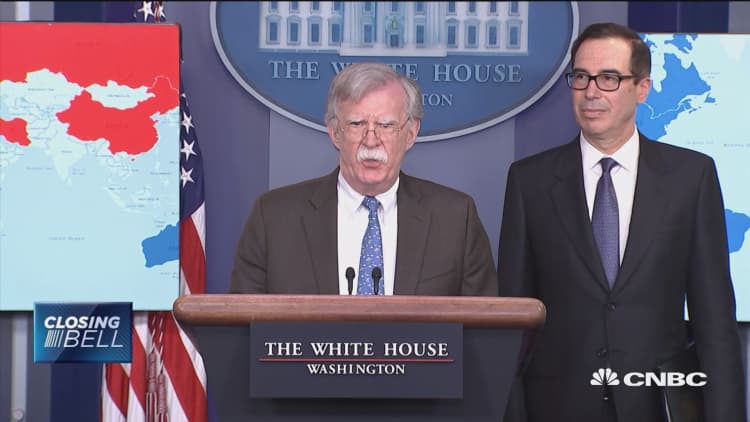
The Trump administration will sanction Venezuela's state-owned oil firm, a move the White House has long put off for fear that it would raise oil prices and hurt American refiners.
The move comes after a turbulent week for Venezuela that has created a standoff over the country's leadership. The sanctions aim to transfer control of Venezuela's oil wealth to forces that oppose socialist dictator Nicolas Maduro and deprive the strongman of resources that could prolong his grip on power.
Last week, the opposition leader of Venezuela's National Assembly, Juan Guaido, named himself interim president amid street protests. President Donald Trump soon recognized Guaido as the nation's leader and his administration has been marshaling international support for the opposition figure since then.
Maduro, having recently started another term after highly disputed elections, is refusing to back down. He is supported by the country's minister of defense and Russia.
Treasury Secretary Steven Mnuchin on Monday determined that people operating in Venezuela's oil sector are subject to U.S. sanctions.The nation's energy industry is dominated by state-owned Petroleos de Venezuela, better known as PDVSA.
Mnuchin said PDVSA has long been a vehicle for embezzlement and corruption by officials and businessmen. The sanctions will prevent the nation's oil wealth from being diverted to Maduro and will only be lifted when his regime hands control of PDVSA to a successor government, he added.
"The path to sanctions relief for PDVSA is through the expeditious transfer of control to the interim president or a subsequent democratically elected government who is committed to taking concrete and meaningful actions to combat corruption," Mnuchin said during a White House news briefing.
Under the sanctions, U.S. companies can continue to purchase Venezuelan oil, but the payments must be held in an account that cannot be accessed by the Maduro regime.
"If the people in Venezuela want to continue to sell us oil, as long as that money goes into blocked accounts, we'll continue to take it," Mnuchin said. "Otherwise we will not be buying it."
Oil prices pared some losses after news of the sanctions broke, but major benchmarks were still down more than 2.5 percent following the official announcement. U.S. crude ended Monday's session 3.2 percent lower earlier in the day.
In order to minimize disruptions and support for humanitarian aid, the Treasury's Office of Foreign Assets Control has issued general licenses that authorize some transactions and activities with PDVSA to continue for a limited time, Mnuchin said. European and Caribbean companies will also be granted licenses so they can wind down business with PDVSA in an orderly fashion.
PDVSA's Citgo refineries in the U.S. will be allowed to continue to operate, but revenue must be placed in an escrow account in the United States. Citgo operates three U.S. refineries with a combined ability to process about 750,000 barrels per day of crude oil into fuels.
Earlier Monday, Reuters reported that Guaido's coalition is racing to take control of Citgo before an interest payment linked to PDVSA's bonds maturing in 2020 comes due in April. If PDVSA fails to make the payment, it would open a path for creditors to make a claim on Citgo's assets.
Venezuela's oil production has cratered in recent years after a long stretch of mismanagement and economic crisis that has prevented PDVSA from maintaining output, creating a vicious cycle of falling supplies and revenue.
Still, Venezuela remains one of the largest suppliers to U.S. refineries. Venezuela shipped an average of 580,000 bpd of crude oil and petroleum products to the country in the year through October 2018, the last month data were available.
Venezuela is a major supplier of heavy oil, which is largely used to produce distillates like diesel and jet fuel. PDVSA relies on imports of super light oil to dilute its heavy crude before its shipped out.
The U.S. sanctions will place limits on selling oil products, Mnuchin said, but the Treasury is not currently pursuing an embargo against sales to Venezuela.
Confirmation of the administration's intent to sanction PDVSA came from Sen. Marco Rubio before to the news conference, after Axios earlier reported the impending actions.
"The Maduro crime family has used PDVSA to buy and keep the support of many military leaders," Rubio said in a statement. "The oil belongs to the Venezuelan people, and therefore the money PDVSA earns from its export will now be returned to the people through their legitimate constitutional government."


